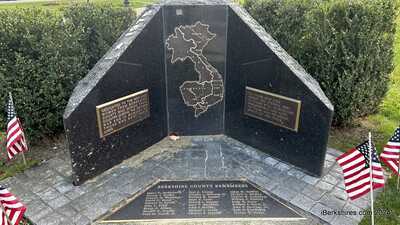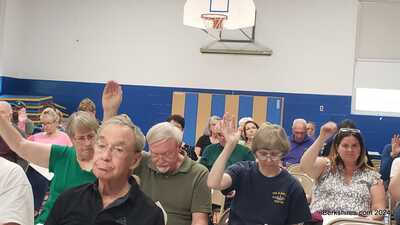Williamstown Select Board Weighs in on FY26 Budget, CPA GrantsThe board decided to put off a decision on its recommendation for an article related to the sewer department, and the panel split on whether to support a series of appropriations of Community Preservation Act funds. Willamstown Community Preservation Committee Ups Recommended Funding LevelsNon-profits seeking Community Preservation Act funds in fiscal year 2026 will receive a little bit more than expected if town meeting agrees with the recommendations from the Community Preservation Committee. Williamstown Community Preservation Committee Funds Proposals at Half the Levels SoughtThe committee started its consideration of fiscal year 2026 requests with applications totaling about $294,000. Williamstown CPA Requests Come in Well Above Available FundsThe Community Preservation Committee faces nearly $300,000 in funding requests for fiscal year 2026. Pittsfield CPA Project Eligibility Application Process OpenThe Committee also welcomes public participation to understand community priorities as it begins a new year of soliciting potential projects for funding. High Turnout as Williamstown Passes Local Tax ExemptionThat question to create a tax exemption to the Community Preservatoin Act passed by a margin of 2,177-977. Williamstown Nov. 5 Ballot Includes CPA Tax ExemptionQuestion 6 on the Nov. 5 ballot would finalize an exemption to the Community Preservation Act property tax surcharge for homeowners who meet either low-income or, for seniors, moderate-income standards. Clarksburg Ballot Initiative Could Mean Funds for Housing, Historic PreservationTown officials also have supported adoption of the act as a way to leverage funding from the state to address community needs the town can't afford. Leftover CPA Funds Restoring More Pittsfield PlaquesThe idea is to restore two Park Square plaques with the remaining funds: The Old Town Hall marker and the Vietnam Veterans Memorial. Clarksburg OKs $5.1M Budget; Moves CPA Adoption ForwardThe annual town meeting sped through the questions on Wednesday night, swiftly passing a total budget of $5.1 million for fiscal 2025 with no comments. Pittsfield Council Sees $808K in Community Preservation FundsThe City Council last week saw 11 Community Preservation Act funding allocations totaling $808,547. Clarksburg Holds Information Session CPA Warrant ArticleAn informational meeting on the Community Preservation Act will be held on Wednesday, May 1, at 6 p.m. at the Clarksburg Elementary School. Pittsfield CPA Committee Funds Half of FY24 RequestsThe projects not making the cut were in the historic preservation and open space and recreation categories and though they were seen as interesting and valuable projects, the urgency was not prevalent enough for this cycle. Pittsfield CPA Committee OKs Funding Extension, Plans Formal ProcessThe proposal came out of a project that the panel had done on endangered properties funded by the Massachusetts Historical Planning Project. It was considered best practice at the time to identify properties that were in danger of being torn down before they needed to be demolished. Clarksburg to Consider Community Preservation ActThe Select Board on Thursday voted to place the adoption of the state Community Preservation Act on the town meeting warrant at the request of the Historical Commission. Williamstown Community Preservation Committee Advances Funding RequestsThe first break the CPC got on Wednesday was when its total number of applicants dropped from six to five. Pittsfield Housing Trust to Collaborate with CPA ApplicationsThis year there are two CPA applications for community housing. Williamstown Receives Nearly $400K in CPA RequestsAccording to a spreadsheet on the town's website, the Community Preservation Committee is anticipating having up to $232,532 available for the FY25 funding cycle. Pittsfield Housing Trust Looks to Involvement with CPA ProcessThe Affordable Housing Trust will offer its expertise for Community Preservation Act applications related to housing. Pittsfield CPA Eligbility Applications Due This WeekFrom that time to Dec. 4, eligibility applications will be reviewed and accepted applicants will be invited to submit a funding application due in February. Pittsfield First Church to Seek CPA Funds for Boiler ReplacementWith an OK from the Historical Commission, the city's first church intends to seek Community Preservation Funds for a boiler restoration. Pittsfield CPA Project Eligibility Applications OpenThe hearing will be held in Room 203 on the second floor of City Hall, 70 Allen Street. Pittsfield CPA Committee Supports Out of Cycle Arrowhead ApplicationOn Monday, the panel approved a $10,000 allocation of Community Preservation Act monies for Berkshire Historical Society to repair a chimney that is compromising the former home of author Herman Melville. Pittsfield Community Preservation Committee Supports 8 ApplicationsThe Community Preservation Committee has voted to fully fund eight applications in community housing, historic preservation, and open space and recreation totaling almost $649,000. Great Barrington CPA Committee Recommends Funds for Housing, Historic Preservation, ConservationCPA funding is raised through a property tax surcharge and supplemented by State funding. More information can be found on the town website. |











